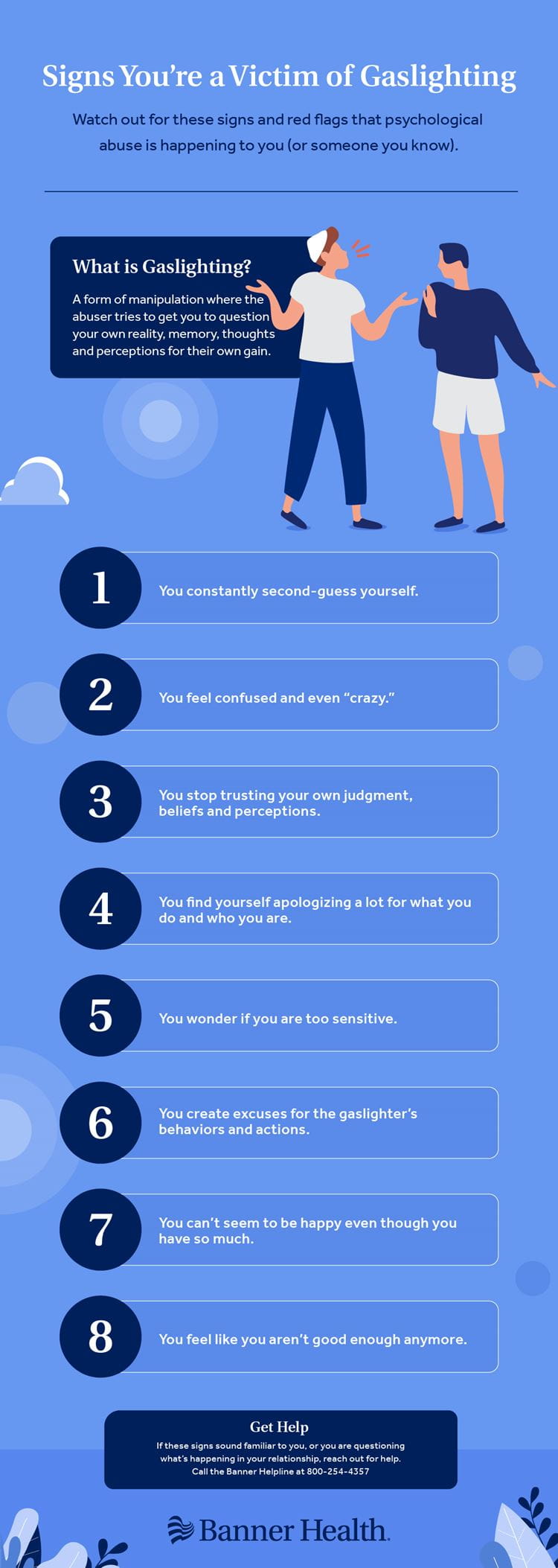“You’re crazy. That’s not what happened.”
“You’re remembering it wrong.”
“You’re too sensitive. I was only joking.”
Is your mind playing tricks on you? Are you starting to question your own sanity? If any of the above statements sound familiar, chances are you’ve been gaslighted.
What is gaslighting?
A term taken from the 1938 play “Gas Light,” gaslighting is an actual and serious form of psychological abuse. It is a psychological manipulation tactic someone uses to make others doubt their memories, perception of reality and judgments.
While you might think this form of abuse is easy to identify, done well, you might not even realize it is happening until suddenly you start to wonder if you’re going crazy.
“The truth is anyone is susceptible to this form of manipulation—actually manipulation and gaslighting go hand in hand,” said Jerimya Fox, a doctor of behavioral health at Banner Behavioral Health Hospital. “Sometimes the manipulation is done in such a slow, covert fashion—a slow burn, if you will—that the victim doesn’t even realize they’ve been brainwashed.”
While brainwashing and manipulation are common tactics of cult leaders and dictators, gaslighting can occur in personal relationships and professional working relationships. “A gaslighter wants to gain power and control over their victims—to strip them away from their own thoughts and feelings,” Dr. Fox said. “They know very well what they are doing and have no desire to change that.”
Tactics of a gaslighter
There are many manipulation techniques that gaslighters use—some more subtle than others—and typically they occur in stages. Some of the most common gaslighting techniques include:
- They blatantly lie. The abuser blatantly and habitually lies to change another person’s reality. Even when you know they are lying, they can convince you otherwise, which in turn makes you start second-guessing yourself.
- They attack things important to you. They might criticize your job, make snide comments about you, your family or friends. These remarks are meant to make you feel insecure and inadequate.
- They project. Let’s say the abuser is cheating. Instead of admitting to the affair, they’ll accuse you of being unfaithful. You end up defending yourself rather than seeing what they’ve been doing to you.
- They manipulate your relationships. Whether through isolation or through groupthink type behaviors. They’ll tell you your family members don’t love you and they are liars. Or conversely, they’ll convince everyone around you that you seem emotionally unstable or “crazy.”
- They wear you down. Even the brightest, most self-aware people can fall prey to this insidious behavior. It’s like the analogy of a frog in a pot of boiling water. The aggressor slowly turns up the water in a pot, telling a lie here and a lie there, until suddenly you’re “boiling” never realizing what’s been happening all along.
- They dangle compliments as weapons. One minute, they may cut you down and the next, they praise you. This is all an attempt to keep you off-kilter.
“Remember, all these actions and behaviors are used in an effort to manipulate and control others to meet the needs of the abuser,” Dr. Fox said.
If you believe you’re a victim of gaslighting, ask yourself if the following statements ring true.
Don’t be a victim
If you identify with any of the signs of being gaslighted, here are some tips to take back control of your life and your reality.
- Realize you aren’t responsible for someone else’s behavior. No matter what the gaslighter tells you, their behavior is not your fault.
- Set boundaries to protect yourself and expect them to be respected.
- Document what really is happening, so you can track reality and go back and check the truth later for yourself.
- Acknowledge the feelings you are having are real.
- Recognize that you aren’t going to win an argument with this particular person. This is a game they play, and you’ll be hard-pressed to convince them you’re right and they’re wrong.
- Ask a trusted friend or family member if they think your potential abuser is manipulating your thoughts.
- Limit contact with the gaslighter.
- If it’s unsafe, report it and seek help.
“It’s important to understand that gaslighting is a type of abuse,” Dr. Fox said. “It’s an emotional abuse tactic that can leave you unsure about yourself, others, and life in general. If you don’t address it, it can have long-lasting effects emotionally and physically. Counseling and therapy can help you understand what you are experiencing and help you set boundaries within relationships.”
Find help now
Gaslighting can feel isolating, but don’t handle this alone. It’s important to seek help from a mental health professional.
Here are some resources to help handle a crisis and a potentially abusive relationship:
- Contact the Banner Helpline at 800-254-4357 or schedule an appointment with one of our licensed professionals at Banner Behavioral Health.
- Contact the National Domestic Violence Hotline at 800-799-7233.



